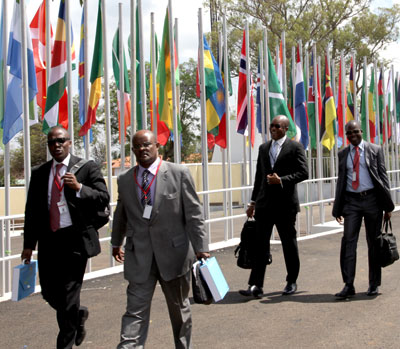Editor, This is in reference to the article, “Tech empowerment key to Africa growth – AfDB report” (The New Times, May 20).


Editor,
This is in reference to the article, "Tech empowerment key to Africa growth – AfDB report” (The New Times, May 20).
Gross Domestic Product (GDP) growth is a poor indicator of whether populations of Africa have seen any relief from poverty. Look at Nigeria, considered as the fasted growing economy (7.4%): the population living below the poverty line went from 54.5% in 2010 to 63.3% in 2012.
Rwanda may have seen its poverty rate decrease, but inequality gaps have increased.
So the AfDB conference should tackle the issue more openly, rather than give lip service to "more equitable” development. Change starts with using appropriate language: why not name poverty and inequalities directly?
Kabaka, Rwanda
*************************
In a free market-based economy, how do you propose dealing with the issue of inequality (its elimination or limitation) without discouraging those whose capital is needed for the economy to grow and provide the fruits from which to cater for public goods?
True, economic growth can never by itself ensure poverty reduction, but without it you are guaranteed an increase in poverty rates.
The trick therefore—and it is easier recognised than doing anything about it—is to have policies and programmes in place that provide an enabling environment for the formation and growth of enterprises of all sorts and sizes (from household microenterprises to large-size companies through small and medium-sized companies) in a varied number of sectors (an increasingly diversified economy), that generate profits and tax revenues from which governments can provide support and basic social protection to those who are left behind by a free-market economy, extend education and impart the technical and other skills required by a vibrant labour market and extend health support to the population as a whole.
The question, however, is how to sequence all of these services. Too early and the high fiscal burden will kill the golden egg even before the goose can lay it (sometimes this happens in Rwanda when, instead of encouragement, the taxman insists on taxing nascent firms even before they have made a profit).
Too late and the inequality you spoke about will create social tensions that act as headwinds against needed investments for growth from whose profits the resources for all the above public goods must come from.
And so the question, again: How do you, in practice, ensure growth and the equitable distribution of its fruits, and how do you sequence the two in the most effective and efficient manner when the growth is primarily driven by private capital of both Rwandan private individuals and foreign direct investment and when both sets of investors require an adequate rate of return in order for them to continue to invest and thus continue to drive the needed growth?
Mwene Kalinda, Rwanda


